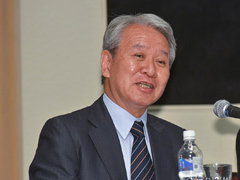JICA President Akihiko Tanaka attended the "High-Level Seminar on Peacebuilding, National Reconciliation and Democratization in Asia," sponsored by the Ministry of Foreign Affairs, at United Nations University in Tokyo on June 20.
At this seminar, after a keynote address by Fumio Kishida, the Japanese foreign minister, the following guest speakers delivered introductory speeches: José Ramos-Horta, former president of East Timor and current chair of the High-Level Independent Panel on UN Peace Operations; Mangala Samaraweera, the Sri Lankan foreign minister; Al Haj Murad Ibrahim, chairman of the Moro Islamic Liberation Front; and Yohei Sasakawa, special envoy of the Government of Japan for National Reconciliation in Myanmar. The speakers talked about valuable knowledge and lessons learned from their experiences in building peaceful societies in their own countries.

JICA President Akihiko Tanaka
Tanaka spoke at an “interactive session” held after the speeches. With David Malone, rector of the United Nations University, acting as moderator, the following participants engaged in a lively discussion: Surin Pitsuwan, former secretary-general of ASEAN; Noeleen Heyzer, special advisor of the UN secretary-general for East Timor; Takashi Shiraishi, president of the National Graduate Institute for Policy Studies; and Akiko Yamanaka, special ambassador for Peacebuilding, Japan.
Tanaka first noted that, in a post-conflict situation, it is imperative to pursue political settlement among key stakeholders before any state-building effort, including development assistance, can take place. He further pointed out a potential role development assistance can play in promoting such a process. He emphasized that in order to bring the parties concerned to the negotiating table and to maintain peace, it is important to make their “expectations for the future” positive ones because engagement in negotiations can be interpreted as an investment in the future. He referred to three key elements important for making the parties concerned sufficiently motivated to engage in negotiation: 1. quick distribution of peace dividends, e.g. through small-scale infrastructure improvements; 2. ensuring fairness to the parties concerned, such as by adopting an inclusive approach in making resource allocation decisions; and 3. realizing continued assistance based on a long-term commitment.
A number of important points were made by other speakers during the session, including the following:
- Each conflict is unique in terms of its context and therefore requires a differentiated approach to peacebuilding.
- Democratization is more than conducting free and fair elections; it involves establishing an effective political system.
A wide-ranging discussion took place, covering such topics as the expansion of violent extremism, and issues related to the Rohingya people of Myanmar. Opinions and questions from the floor touched on such issues as difficulty in identifying credible peacebuilders from among the fighters, and the importance of civic education in promoting peace in conflict-affected situations.
Before this event, Tanaka held individual talks with Samaraweera on June 18 and Murad on June 19.
Samaraweera expressed gratitude to Japan and JICA, Sri Lanka's main development partners for the past 60 years. He and Tanaka discussed issues relating to Sri Lanka's efforts to become a middle-income country, including encouraging foreign direct investment; creating high-quality infrastructure (such as urban transportation); firmly establishing peace, which is important as a basis of development; and promoting reconciliation among citizens.
Tanaka's discussion with Murad was his first in a year, coming after a conversation at a Mindanao peacebuilding seminar in Hiroshima in June 2014. They discussed the future prospects of the ongoing process of establishing the Autonomous Government of Bangsamoro, a recent event of MILF members’ disarmament and more. Tanaka affirmed to Murad JICA’s continued commitment to be a positive contributor to the Mindanao peace process.




scroll